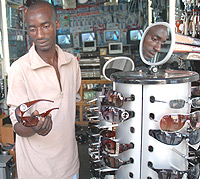I’m nursing my housemate Willy who was mugged on Saturday night. He has a job in the City, and that night he had just worked the night shift. I was shocked to see the wounds on his face and bruises on his back. It was only after two hours of silent disbelief was he able to relay his story.


I’m nursing my housemate Willy who was mugged on Saturday night. He has a job in the City, and that night he had just worked the night shift. I was shocked to see the wounds on his face and bruises on his back. It was only after two hours of silent disbelief was he able to relay his story.
He was walking around the area popularly referred to as ‘Peage’ shortly after midnight in an effort to catch a ‘moto’ for home. Being so late in the night, the human traffic was almost none existent so it was not had to spot three young men.
Two walked behind him and one was about two meters in front of him, tying his shoelaces. As Willy passed by the man in front of him, he jumped at him and grabbed him by the throat. The other two joined in the attack.
They took everything he had which included a mobile phone and a wallet. The good number of blows and kicks he received were enough to intimidate him and prevent him from making a single noise to call for help and avoid being seriously injured or even killed.
He had no money left and, therefore, had to slowly and painfully walk home to Kacyiru, about fifteen kilometers from the scene.
He cannot report anything to anyone. He has no evidence and nothing precise to report. He is one of the many who are being attacked at night in Kigali City.
An indication that criminal activity could be on the rise, a case in point - an article that was published on Saturday February 7, 2009 in this newspaper, titled "Woman shot dead, robbed Rwf15m.”
Unidentified assailants shot dead Rose Nyiranzisanira Bizigaba, a business woman in Kimironko Gasabo District, robbing her Frw15 million that she carried. To make things worse, she was attacked in broad daylight, in the morning around 6:30 am and shot her to death.
Definitely there are more cases. I guess the screaming I heard on Friday night was an attack on someone. Early this year, the Police reported that crime had reduced by 30 per cent. But they said most of the reduced cases are of gender based violence and violence against children.
They attributed this development to the community policing programme adopted in 2008. Community policing is a police strategy where community members in the neighborhood work together to identify, prevent or stop and report crimes to the police.
This strategy has helped a lot in cutting down the number of crimes in our communities, especially in Kigali city. But like the director of community policing in the Rwanda National Police force, Chief Supt. Emmanuel Butera, said most reduced crimes are gender based violence.
In October of last year, Kigali City received the most prestigious human settlements accolade in the world - the Habitat Scroll of Honor award. The award did not only mean that Kigali City is the cleanest, but also has a peacefulness and security that has impressed many tourists.
It is often said that our city is so peaceful that one can walk with a million francs and other properties at night without fear. But those two incidences, especially the shooting of the businesswoman is a clear signal that there is a possibility of a rise in crime.
Unemployment is a major cause of crime in cities worldwide. The case in Kigali city is no different. More and more youth in Kigali are ending up jobless. This situation is facilitating a long and potentially serious criminal career in our city.
Some of the strategies or policies the city council has been implementing in the city are to arrest idlers and hawkers. For many of them, the best option for survival is to get a "kilaka” on the street or try to be a hawker or do any simple service to earn some money.
Bosco has been peddling confectionery for the past eight months. Although he earns little, he would rather do this than engage in petty crime, though the temptation to do this is ever there.
Jean Pierre dropped out of school in P5 and has since been engaging in small jobs that earn him an equivalent amount of money around town. But the city council has always been intolerant to hawkers.
Our economy is so weak that we need to allow very many small businesses like hawking and simple services for people to earn a decent living.
Due to the limited number of industries and factories that these people can be employed in as manual labourers, or the lack of plantations where these people can get jobs, all forms of informal employment should be encouraged.
Contact: magnusmazimpaka@yahoo.ca


